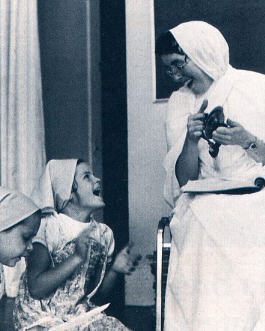Higher Education
For four of her five years as a member of the Krsna consciousness movement, Moksarupa-devi dasi has been a teacher Krsna conscious schools. Not long ago she was interviewed by James Stepney, a freelance writer.

Mr. Stepney: What is the difference between modern education and Krsna conscious education?
Moksarupa-devi dasi: The main difference is that Krsna conscious children chant Hare Krsna and worship God throughout the day. As a result, they become relieved of all sorts of psychological problems and can work with an alert mind. There was an elderly lady who used to watch me taking the children to the park every day in Seattle. She lived across the street from a public school. One day she stopped me and asked, "How do you keep your children so well behaved? Every day I see the children in that school across the street yelling, fighting, arguing. But your children always look so neat and clean and well behaved."
I explained to her that our children learn how to live with others in a cooperative spirit by seeing one another as spiritual beings, all part and parcel of God. That way they have a natural respect for one another and a natural self-discipline. There's very little tendency for cruelty, lying, or cheating. Education for these children is not meaningless facts and dates but rather a meaningful development of character and higher consciousness, God consciousness.
Mr. Stepney: Can you give a practical example of what you're talking about?
Moksarupa-devi dasi: Yes. Our children learn all the basics, but in a God-centered way. Take English. After they've gone through a standard primer, the children get to read about Krsna, transcendental pastimes with His devotees. And that's the subject matter they use for learning how to analyze grammatically, how to summarize, how to spell, how to write an essay, and what have you. In math they might figure out how many apples it will take to make x number of apple pies, and yet at the same time they'll have the understanding that the pies are going to be offered to Krsna and distributed to guests at a transcendental love feast. You see? So what the children learn helps them understand God and their relationship with Him. From the very beginning, their life has meaning, because for them God is a meaningful person. As they develop love for God, they also develop love for everyone else as part and parcel of God: They have great love and respect for the teachers and no desire to inflict pain on others.
Mr. Stepney: Would you say a Krsna conscious education could cure a delinquent?
Moksarupa-devi dasi: Well, I'm no expert on crime, but I understand that it's children who hate and have known hate that become delinquents. And Krsna conscious children feel no hatred toward anyone; because they see that everyone comes from Krsna.
Mr. Stepney: Just in general, what about children who enter a Krsna conscious school after they've spent some years in ordinary public schools? Do they have a hard time adjusting?
Moksarupa-devi dasi: Sometimes we get problem cases, but even then, most children seem relieved to be in a God conscious setting. It doesn't take long for them to make friends with the other devotees and feel right at home. We have a good example here: One eight-year-old boy came to us from a typically heavy streets-of-New-York background. He was cynical, tough, rude, and miserable. But now, maybe for the first time in his life, he's happy. You can see it in his face. His gentle, spiritual qualities have come out.
Mr. Stepney: Apart from academics, what else do children do in a Krsna conscious school? Does this kind of education require a restrained, passive routine?
Moksarupa-devi dasi: Not at all. The children fulfill their natural desires for fun and enjoyment. They go outside and play vigorously; their life is full of color. They spend days at a time visiting our farming villages and learning how to do things like taking care of the cows. Aside from field trips to the zoo, sometimes they travel to other cities for transcendental festivals. At the festivals they do ancient Indian drama and dance, and they sing songs for the guests in Hindi, Bengali, and English. And they're learning how to cook and sew and paint and play musical instruments. They do all sorts of things. The key is that Krsna, the Supreme Lord, is at the center of whatever they're doing. It's just like a lady said to me a couple of days ago. She came over with this delighted expression and said,' "Nowadays we hardly ever see children like your children. They look so bright and happy."
